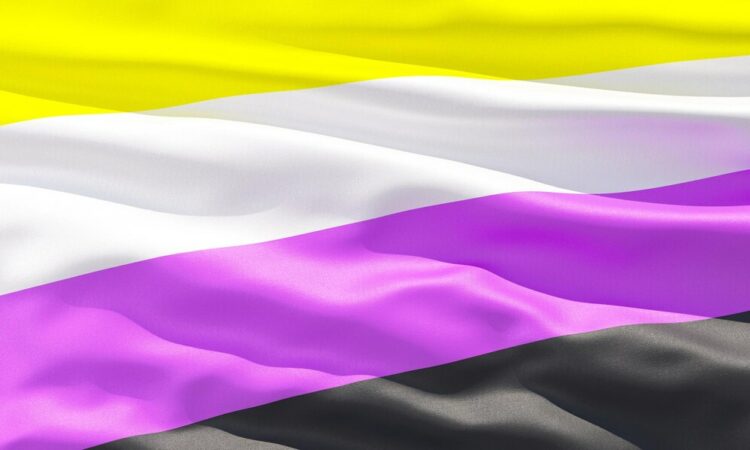In the picture

July 14: International Day of Non-Binary Visibility
published on 17 July 2023
Genres Pluriels Let’s Talk About Non-Binary
Being non-binary
Non-binarity is a gender identity in its own right. Non-binary people don’t identify with the social categories of male or female, but may recognize themselves in a combination of the two, as neither male nor female (neutral), as gender fluid, or as partially or totally rejecting the notion of gender (agender).
Being non-binary can be considered a trans-identity, as non-binary people do not recognize themselves in the gender assigned to them at birth. However, not all non-binary people have the social and material experience of a trans person, or identify as trans.
Non-binary people may feel a sense of discomfort or disconnection from the gender roles and expectations that society imposes on them, and they may feel a profound sense of relief and affirmation when they are able to express their gender in a way that feels authentic to them. Non-binary people may choose to use a variety of pronouns and express their gender in a variety of ways, which may not correspond to traditional gender norms or expectations.
There are many ways to express or not express non-binarity. There are also many ways of feeling and experiencing it. Non-binary identities are far more diverse than the media make them out to be.
The rights of non-binary people in Belgium.
Last month (June 2023) the Justice Committee of the House of Representatives approved the repair of the text of the so-called “transgender” law. This revision follows a 2019 ruling by the Constitutional Court that, as it stands, the law discriminates against gender-fluid and non-binary people.
The part concerning gender fluidity was widely supported, with the exception of the N-VA and Vlaams Belang, who voted against it. It is now possible to change gender and first name as many times as required. This change was previously irrevocable. In addition, the procedure before the family court has been abolished and the process made easier.
Another important advance is the de-correlation of gender and first name. It is now possible to change one independently of the other. This means that it is no longer compulsory to choose a first name that corresponds, according to the standards, to the registered gender.
What’s more, changing one’s first name without changing one’s gender was no longer considered a social transition. Fees were left to the discretion of the local authorities, and were generally much more expensive.
For the time being, changing one’s first name is the only option available to non-binary people to bring their gender identity into line with their civil status (by adopting non-gender-specific first names, for example). In fact, the Chamber has postponed the recognition of non-binary identities to an unspecified date, despite the fact that the Court has highlighted discrimination against people who identify as neither women nor men. While gender fluidity has been legally recognized, it is only possible between the two poles M and F.
Recognition of non-binary people implies greater societal change, including reform of the gender markers on identity cards. While many parties, institutions and activist groups agree that gender markers should be removed, an ideological blockage persists on the right, despite the fact that the European Parliament’s regulation makes the mention of gender optional, and even includes it among the personal data to be protected. The Court states that maintaining binary gender categories in birth certificates is not “reasonably justified”.
However, it must be emphasized that the repair of the transgender law, by recognizing fluid gender identities, visibilizes other ways of thinking about gender, makes late coming-in valid, legitimizes non-linear paths and renders obsolete many clichés about the ways of living one’s transidentity. It remains a major step forward.
The member association Let’s Talk About Non Binary and the importance of being in a collective
The collective was founded in 2021 by and for people who identify as non-binary/genderfluid/genderqueer/gender non-conforming regardless of the “umbrella” under which they shelter (trans*, inter, queer, …). Whether you recognize yourself in these terms or are still wondering, you’re welcome to join us.
The creation of the collective was motivated by the lack of representation of non-binary identities, including within LGBTQIA+ organizations.
The main aim of the collective is to offer support and share experiences and resources on non-binary identities, as well as facilitating the organization of events such as discussion groups, workshops, meetings, hang-outs, etc.
Being part of a community allows us to invent our own social spaces, our own way of relating to others, without having to justify ourselves. Being seen and recognized by other non-binary people is liberating and empowering.
On the occasion of Non-Binary Visibility Day, Let’s Talk About Non-Binary shares these demands.
- I’m non-binary and I’m calling for the removal of gender markers from identity cards, forms and other forms of identification. As they stand, they can serve to discredit my gender identity, my right to self-determination and can compromise my security.
- I am non-binary and I demand that information concerning my sex assigned at birth be restricted to my medical records.
- I am non-binary and I need an end to assumptions about my gender identity, no matter how I express it.
- I am non-binary and I need my education and the teaching I receive not to be based on my sex assigned at birth.
- I am non-binary and I need my rejection of binary norms not to be used against me, to discredit me, to deny me access to speech, to work, to housing, to psychological and physical health, and thus to make me insecure.
